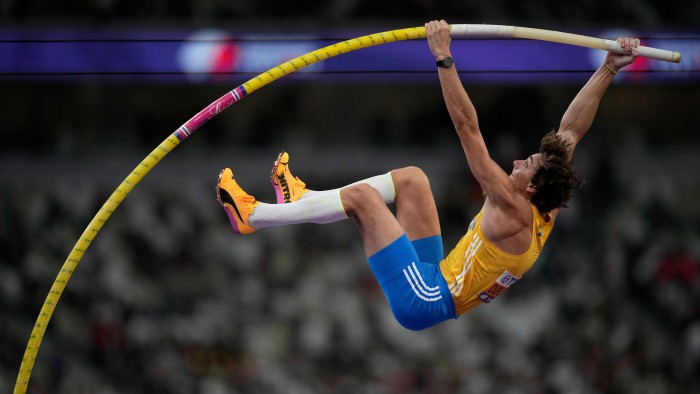Late on Monday, knowing that the gold was already his, Armand Duplantis launched himself into the muggy Tokyo night for an attempt on the highest pole vault jump in history.
Looking back up at the bar, wobbling but definitively cleared, the Swedish-American prodigy fell an ecstatic 6.30 metres down towards the mat, engulfed in a roar from the crowd that infused every strut and stanchion of Japan’s National Stadium: a magnificent gallery finally, finally displaying the masterpiece it was built for to the audience it dreamt of.
The sound that accompanied Duplantis’s descent was a collective bellow from the wounded viscera of Tokyo that went far beyond the miracle of a single soaring Swede. This was a cheer for a landmark passed; for an achievement that at one point felt beyond imagining; for a closure that felt more deserved in this city than elsewhere. Because, whenever else you think the Covid-19 pandemic might have ended, for Japan at least this past week in Tokyo marked the true end.
Duplantis himself, one of the megastars of the ongoing World Athletics Championships in Tokyo, inadvertently hinted at why that was so. Many other athletes, panting in victory and talking to interviewers this week, have expressed the same delicious contrast between now and then. “The stadium was so different from the last time I was here,” said Duplantis, “I think the difference was being able to have spectators, and the full energy of the crowd.” Last time he won a gold medal on this exact spot, the stadium was almost completely empty and more or less silent.
The event four years ago was doggedly and pitiably calling itself the Tokyo 2020 Olympics. But this was in fact the summer of 2021 and, for all the excellence and sporting achievement it produced, the spectacle was a masked, hear-a-pin-drop affair which served chiefly to amplify the global sense of otherworldly weirdness gripping the planet at the time.
And in the eerie 2021 disjointedness of the National Stadium, Japan, as host, was putting itself through some truly almighty conniptions just to keep the five-ring circus on the road.
The city and the nation had been absolutely ready for 2020. Japan had spent billions, endured eye-popping corruption scandals and raised questions over the sanity of any nation staging such a burdensome showcase: the now familiar hat-trick of the Olympic host.
Tokyo 2021 was a masked, hear-a-pin-drop affair which served chiefly to amplify the global sense of otherworldly weirdness gripping the planet
And the city knew, in its vigorous, sport-obsessed heart, that if it had not been for the pandemic, it would have staged perhaps the greatest Olympics ever. When that couldn’t happen, it was forced to navigate an unprecedentedly complex journey of postponement, restriction and restructuring whose destination, everyone knew all along, would always be disappointing. But Tokyo managed to do it all with deep pockets, organisational chops, goodwill and a smile — concealed, admittedly, behind an N95 mask. Could any other city have managed that? Almost certainly not.
“You wouldn’t wish that test on anybody,” Sebastian Coe, the president of World Athletics and Chair of the London 2012 Olympics organising committee, told me from a seat high in the stadium. “There aren’t that many countries in the world that would have been able to see their way through.”
Shortly after the Olympics were finished, Tokyo was told that efforts would be made to reward the extraordinary feat of keeping the Olympic flame flickering. The World Athletic Championships, it was later decided through a formal selection process, would be held in the Japanese capital in 2025, to provide the city with both the first major international sporting competition to take place in its National Stadium, and the massed human soundtrack it always craved.
This past week has, in every way, been that event. The Duplantis jump was magnificent, but every day has produced magnificence to the endlessly vocal delight of a huge nightly audience from Japan and the rest of the world.
This event needed to happen, and in this city. Obviously sport, concerts, festivals and other mass events have rebounded globally since the pandemic. In many instances that rebound has exceeded pre-crisis levels of enthusiasm and participation. The Paris 2024 Olympics provided, for many of the athletes in Japan this week, the gigantic spectatorship that spurs ever greater greatness.
Tokyo’s status as host of the WAC, however, is different precisely because of the silence in the stadium four years ago. It arrives with the specific scar tissue of both the survivor and the superfan. Other countries, especially those expressly craving its soft power, talk a very good game about how much sport means to them, and how overarching is its value to society and humanity.
Tokyo, like no other city, had its devotion tested by the pandemic and was found willing and able to step up. This past week of athletics has been both a celebration of that moment of stoicism, and of the fact that such stoicism is no longer necessary. The beer is back in the stadium taps; the clap-o-meter records a deafening percussion of hands for every long, high and triple jump; the Jamaican travelling supporters are out in force. Tokyo has reminded us, despite all the world’s other troubles, of just how lucky the world is.
Email Leo at leo.lewis@ft.com
Find out about our latest stories first — follow FT Weekend on Instagram, Bluesky and X, and sign up to receive the FT Weekend newsletter every Saturday morning


AloJapan.com